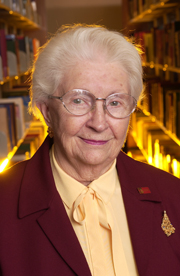
Charlotte Edwards Maguire, M.D.
Dr. Charlotte Maguire has another framed certificate to hang on her already crowded walls. On July 25, the Capital Polio Association gave her a “Spirit of ADA” award for a lifetime of advocating for children with disabilities as well as treating them.
“She was there in the trenches during the polio wars in the years of the worst epidemics,” wrote Mark Ravenscraft, association president, in a letter to members also marking the 20-year anniversary of the Americans with Disabilities Act. “She knows what a tremendous victory was won with the Salk and Sabin vaccines – she was part of it and remains part of it today by speaking out on public health issues and using her resources to give back to the community.”
In the 1940s Maguire became one of Florida’s first female pediatricians. She went on to have a distinguished career in private practice, state and federal government and much more. In the late 1990s her generous donations to Florida State University helped to pave the way for the creation of the university’s College of Medicine, which she has continued to support in numerous ways. The medical school’s electronic library and simulation center are named for her.
So is the building at Westminster Oaks retirement center, where she gratefully received her award. She has lived at Westminster Oaks for 18 years.
“If you don’t live here,” she told the audience with a smile, “I feel sorry for you.”
She got up to the stage by using the Maguire Center’s mechanical lift, the kind of device that was much less common in the days before ADA. Ravenscraft, who had polio when he was a child, recalls what those times were like.
“All of us [with disabilities] can remember the days before ADA, when any outing required research, phone calls, and careful planning to find the ‘back entrance,’ or the ‘freight elevator,’ or the least number of steps or obstacles to get where we wanted to go,” he wrote. “And sometimes, more often than not, it simply wasn’t possible.”
The ADA, he said, “was a tremendous leap forward.”

